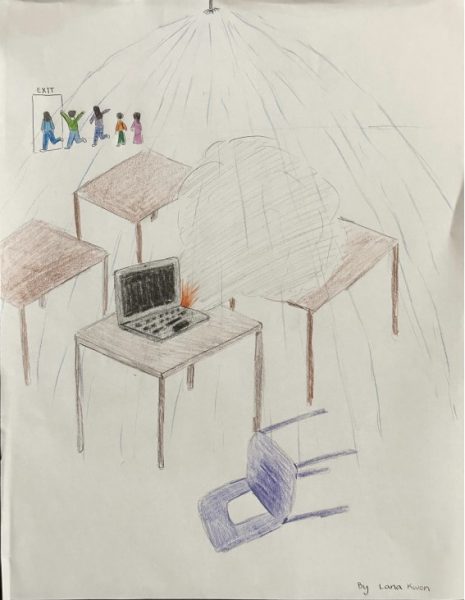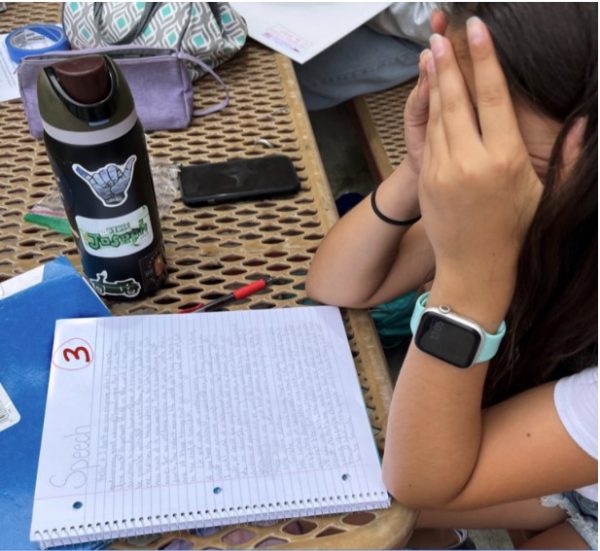Warriors Take A Closer Look at the Effect of Cancel-Culture on the 2022 Beijing Winter Olympics
February highlighted the 2022 Winter Olympics in Beijing and cancel-culture has affected its perception amongst viewers
The 2022 Winter Olympics continued to showcase unity and strength through bonding between sports.
The Winter Olympics are the traditional international games held for sports such as snowboarding, skiing, curling and figure skating. Historically speaking, the first Olympics can be dated back to the 8th century BC to the 4th century AD in Olympia, Greece. Hence why every year, Greece is the first country to open up the Parade of Nations. Though the history of the Olympics dates back long before, the first Winter Olympics was not held until 1924 in Chamonix, France. In alignment with the regular Olympics games, the Winter Olympics is held every four years. February highlighted the 2022 Beijing Winter Olympics from the 4th to the 20th, bringing lots of attention to national star athletes. However, this exciting event was met with its criticism even before it began. Using this year as an example, many people pointed out several existing problems and it grew into something known as ‘cancel culture’. Many viewers at home had objections to the way that the games were organized, specifically the issues with the impact it has on the surrounding environment and the discussion of naturalized athletes in the national teams.
The issue stems back to the 1980s when the event organizers first introduced artificial snow. The reasoning behind the fake snow is due to the unpredictability of the weather. Sometimes, when the Winter Olympics are held, there is little to no real snow for snowboarders, skiers and other Olympians to perform their sport. With the increasing problem of climate change, according to Now This Earth, fake snow might be the “new reality” in winter sports. To make the snow for the games, 100 snow generators and 300 snow-making machines blasted almost 49 million gallons of water into the air which then froze to cover the mountain. With these machines, an estimated 42.4 million cubic feet of snow was produced.
Environmentalists worry that creating this fake snow requires a lot of energy usage to power the machines and the effects of the fake snow on the environment are currently unknown. What is known are the ingredients in the mixture which pose an alarming threat to the environment. It includes large amounts of water incorporated with chemicals such as sodium polyacrylate, a superabsorbent polymer, to mimic real snow. A superabsorbent polymer can take up large amounts of water, which raises concerns that the heavy usage of water is depleting to areas that are already strained with water availability issues.
According to Now This Earth, artificial snow is about 30 to 70 ice to air ratio while real snow is about 10 to 90, and this year marked the first year that the snow was almost 100% fake.
Some athletes claim that performing on man-made snow is dangerous as they are not used to it from their practices. Nina O’Brien from the American team and Rina Yoshika from the Japanese team both underwent serious injuries from the fake snow. According to Insider, athletes were technically banned from assessing and practicing the snow prior to the games because of the pandemic. However, unlike other athletes, Yoshika was able to practice beforehand, but still suffered serious injuries to her spine and had to undergo surgery after the games.
TechnoAlpin, the company that makes the fake snow, claims that these injuries were not due to the fake snow, but the lack of practice time the athletes were given on the snow before the games. According to an interview with Insider, the manager of TechnoAlpin Michael Mayr, stated that “the quality of artificial snow can vary by location,” and Beijing’s Yanqing mountains made for a disadvantageous situation as they are “very, very compact” due to the area’s dry, cold conditions. The Beijing Olympics were held between the areas of Beijing and Zhangjiakou, both of which are arid locations. Many pointed out that compared to the white, snowy alpines, the surrounding Xiaohaituo Mountain looks drier.
However, to overcompensate and combat the environmental concerns, Beijing vowed to run a “carbon-negative” Olympics, reducing some concern for the games. What this means is that because China currently has a problem with carbon dioxide (CO2) emissions, they used CO2 from their own natural air to refrigerate the ice rinks, where sports like figure skating and curling were held. This is a first for an Olympics game and it is to reduce the amount of hydrofluorocarbons in the atmosphere as it could lead to ozone depletion. The venues that the sports were held in were 100% powered by renewable energy. Moreover, China hoped to use the Beijing Olympics to demonstrate the use of new climate-friendly technology. For example, the games were powered by electricity from wind farms and the 800 buses that run to the games are hydrogen-powered. As a result of these new improvements being taken, 174,000 tons of emissions were avoided. The absence of foreign viewers at the games due to Covid-19 also resulted in reducing carbon emissions.
Although the negative impacts of the artificial snow remain, many Olympians did acknowledge that the artificial snow is actually perfect for their performance. For example, American athlete Mikaela Shiffrin told CBS Sports that the conditions were “incredible.” Shiffrin fell on the slopes twice and failed to qualify for the next games, but still continued to praise the slopes.Australian snowboarder Matt Cox told news outlets that the snow was “grippy…it’s super cold so like when you set an edge in, you can hold onto an edge.”
Certainly, one cannot ignore the environmental damages, however, it seems almost inevitable when creating a large venue to house hundreds of athletes and enough space for their performance. One must acknowledge that China tried their best at controlling what could be done at the games. In the foreseeable future, scientists will research more on the detailed effects of the fake snow on the environment and the extent to which these can cause problems.
In addition to these environmental problems, critics of the games argue that there is not righteous representation in the teams. This is mainly due to the uncertainty between the athlete’s ethnicity, nationality, identity and citizenship, and how it plays a role in determining teams for each nation. Olympic figure skater Zhu Yi was battered by viewers for representing the Chinese team. Zhu Yi was born in the United States and went by Beverly Zhu before changing it to her Chinese name, Zhu Yi. She is ethnically Chinese, but an American citizen. After being scouted by the Chinese national team in 2018, Zhu renounced her American citizenship. Zhu, though ethnically Chinese, cannot speak the native language and this angered many netizens who baselessly claimed that she got into the team due to her father’s connections.
Similarly, Olympic skier Eileen Gu represented the Chinese team though she is an American citizen. Gu, who was born in San Francisco, decided to give up her American citizenship in order to compete for the Chinese team.
In an interview with RealClearPolitics, South Carolina’s first female governor, Nikki Haley, was one of the first to criticize her saying that “In terms of citizenship, look, China or the U.S.? You have got to pick a side. Period. You’ve got to pick a side, because you’re either American or you’re Chinese, and they are two very different countries.” Haley emphasized the differences between ethnicity and nationality, and seemed angered by the fact that Gu left her American citizenship for another.
Ethnicity refers to the heritage and ancestry of the person while nationality is the country the person was born in. Though ethnicity or nationality are not changeable, citizenship and identity are. A person can hold any citizenship, unrelated to their ethnicity or nationality, as it is a government-issued document obtainable anywhere as long as certain conditions are met. Additionally, a person can identify with multiple countries as ethnicity, nationality and citizenship make up a collective identity. According to the Olympic rules, an athlete does not have to be of a certain ethnicity or nationality to represent a country, but does have to hold citizenship in that country. Some viewers argue that because of naturalized athletes like Zhu and Gu, less native-born athletes are able to compete for their own countries.
Contrary to the accusations, naturalized citizens representing their home countries is not something that is new to the Olympic games. According to a report in citizenship studies by Taylor & Francis Online, naturalization in the Olympic field reached an all-time peak in the years from 1996 to 2016, but they have been around since as early 1948. According to CNBC News, China is one of the many countries that accept the most naturalized citizens on their team. Other countries on this list include the United States, Great Britain, France, Spain, Japan, Australia, Brazil, Italy and Canada.
Alex Hua Tian, an Olympic equestrian, is the first naturalized citizen of China and competed in the Summer Olympics in 2008, 2016 and 2020. Hua Tian was born in London and was born to a British mother and a Chinese father, but many viewers praise him for his abilities as a horseback rider. Like viewers who acknowledged Hua Tian for his athleticism, it is important to respect athletes’ decisions on what team they choose to represent, regardless of their ethnicity or nationality.
What is more, the reasons why athletes such as Gu decide to compete for a different country is truly inspiring. In an interview, Gu told media outlets that she wanted to represent China in order to honor her mother, who was born there. “If people don’t believe me and if people don’t like me, that’s their loss. They’re never gonna win the Olympics,” Gu said in a press conference. After visiting China during many summers of her childhood, Gu fell in love with the country and grew a deep connection with the culture there. Giving up her American citizenship was no easy decision for Gu. Moving forward, if she would one day like to return to the United States, she must apply for a visa or reapply for a citizenship as once a citizenship is renounced, it is irrevocable. Through her participation, Gu hopes to promote the sport in China and encourage more multinational athletes in the Olympics. Gu ended up taking home two gold medals and one silver for her China. Gu proved to the entire world that nationality and ethnicity play no part in an athlete’s ability.
Freshman Annabella Luo believes that athletes like Gu give needed attention to different cultures in the world.
“Watching the Olympics gives me a sense of pride from both my American nationality and Chinese heritage. Of course, many people love to see and experience the joy of winning an Olympic medal, but I think that with all these cultures competing against each other, it brings a sense of unity and sportsmanship amongst them,” Luo said.
Like Gu, Zhu Yi also hoped to bring closure amongst viewers and prove her skills as a figure skater. However, pressured by the online comments, Zhu made critical mistakes in her performance, ultimately costing her the rankings. Overall, Zhu ranked 5th place in the team event and 27th in the women’s single skating program. Zhu fell multiple times, commenting after her performance that “I’m upset and a little embarrassed…I guess I felt a lot of pressure because I know everyone in China was surprised with the selection…I just really wanted to show what I was able to do, but unfortunately, I didn’t.”
This is Zhu’s first Olympic games at 19-years-old and prior to the games, Zhu went through an immense mental fight from a training injury in 2018 which required her to get stitches and go through rehabilitation. After overcoming her impacting injury, she was selected by the Chinese team. Before the games, Zhu told media outlets “I’m excited to have the opportunity to skate for China, and to become another big name. To make myself and the audience happy when I’m skating.” Even though she was happy with being selected for the Chinese team, some were not, which led her to not do her best, showing the impact online comments have on athletic performance. No more athletes should suffer and undergo what Zhu Yi did.
From problems with the venue to issues with the athletes, critics pointed out existing situations in the Olympics this year, ultimately with some pushing for the cancellation of the Olympics as a whole. This should be seen as another facet of cancel culture as the Olympics have been a cultural tradition for many countries. More than ever, many viewers ostracized the Olympic games solely for these reasons and deemed it “canceled”, or unnecessary for future events.
Similar to the Super Bowl in the United States and the CIFs in high school sports, the Olympics are a form of entertainment for viewers and a time to award amazing athletes for their accomplishments. Because the effects of the Olympics span internationally, canceling the event would face great opposition from fans and athletes everywhere. It would also take a great effort and time to do so.
Recently, in the Major League Baseball (MLB) industry, athletes went through a ‘lockout’ because the MLB and the MLB Player Association could not come to an agreement about collective bargaining. It led to the cancellation of the regular season games and athletes being locked out of their own facilities. This upset many MLB fans who have anticipated the baseball season to come as regularly scheduled. As of March 2022, the ‘lockout’ has ended as both sides have come to an agreement, but the reactions instituted by the fans onto the MLB association is a prime example of what would happen should the Olympics be canceled. Furthermore, it can be presumed that it shall be met with even more opposition than the MLB lockout because of the international audience it constitutes.
“I don’t think the Olympics should be canceled. For starters, I am an avid fan of watching the Olympics. It has always been a thrill to see athletes from all over the world compete together and to be able to witness the grandeur performances that will be delivered,” Luo said. “Even if the pandemic continues, but hopefully not, fans around the world can still watch from their screens at home. Additionally, the Olympics brings together all these athletes, connecting the world through sports.”
The Olympics provide a great source for countries, not only financially, but also in that athletes receive well-deserved recognition, whether or not they take home medals for their country. All in all, getting rid of the Olympics is not realistic considering its history and importance in our culture today. In the near future, it is likely that the Olympics will continue with the summer games scheduled for 2024 in Paris, France and for 2028 in Los Angeles. The next Winter Olympics is planned for 2026 in Milano and Cortina, Italy. Despite the ongoing debate, the Olympic committee remains positive as fans around the world support its continuation.
“Something that I enjoy is watching an athlete who has worked extremely hard, win a greatly deserving gold, silver or bronze medal. Good luck to any aspiring Olympic athletes,” Luo said.
The Olympics should not be canceled due to the effect of cancel culture and should continue to remain an integral part of our culture today.
Your donation will support the student journalists of Woodbridge High School. Your contribution will allow us to purchase equipment and cover our annual website hosting costs.

Hi Warriors! My name is Leisa Komyo and this is my third year in the Golden Arrow. I am honored to be working this year as a Co-Editor-in-Chief, photographer...

Hey Warriors! My name is Lucy Liu and I'm really excited to serve as the Features B editor and staff illustrator. This is my third and last year in Golden...









